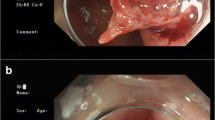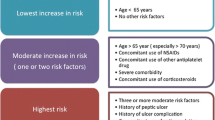Abstract
Patients taking low-dose aspirin for cardiovascular prevention who develop an acute peptic ulcer bleeding event represent a serious challenge in clinical practice. Aspirin discontinuation is associated with increased risk of developing a new cardiovascular event, but there is little evidence on the outcomes and best management strategy in the setting of an acute ulcer bleeding event. In this clinical scenario, it is common clinical practice to interrupt aspirin treatment for various, sometimes long, periods of time. A recent study suggests that patients with bleeding ulcers who keep taking aspirin after successful endoscopic therapy followed by high-dose intravenous pantoprazole, bolus of 80 mg followed by 8 mg/h for 3 days, have a small increase in the risk of rebleeding but a lower overall and cardiovascular 30-day mortality rate than those who stop taking aspirin treatment. Based on current, although limited, data, we propose that these patients should undergo early endoscopic therapy to control bleeding followed by a high-dose intravenous PPI, with early reintroduction of aspirin treatment within a 5-day window after the last dose. However, in patients taking aspirin for the primary prevention of cardiovascular events, it seems reasonable to stop aspirin treatment, re-evaluate the indication and, if needed, reintroduce aspirin after the risk of ulcer rebleeding decreases, usually after hospital discharge. In the presence of an acute ulcer bleeding event soon after the placement of coronary stents, the risk of stent thrombosis with removal of antiplatelet therapy is very high. We believe that early therapeutic endoscopy and a high-dose intravenous PPI is advisable in order to maintain patients on dual antiplatelet therapy. Until more evidence becomes available, clinicians will have to rely on actual data and the use of common sense to select the best option for the patient.



Similar content being viewed by others
References
Taha AS, Angerson WJ, Prasad R, et al. Upper gastrointestinal bleeding and the changing use of COX-2 non-steroidal anti-inflammatory drugs and low-dose aspirin. Aliment Pharmacol Ther 2007 Oct 15; 26(8): 1171–8
Awtry EH, Loscalzo J. Aspirin. Circulation 2000; 101: 1206–18
Antiplatelet Trialists’ Collaboration. Collaborative overview of randomised trials of antiplatelet therapy — I: prevention of death, myocardial infarction, and stroke by prolonged antiplatelet therapy in various categories of patients. BMJ 1994; 308: 81–106
Antithrombotic Trialists’ Collaboration. Collaborative meta-analysis of randomised trials of antiplatelet therapy for prevention of death, myocardial infarction, and stroke in high risk patients. BMJ 2002; 324: 71–86
Patrono C, Coller B, FitzGerald GA, et al. Platelet-active drugs: the relationships among dose, effectiveness, and side effects. The Seventh ACCP Conference on Antithrombotic and Thrombolytic Therapy. Chest 2004; 126 Suppl.: 234S–64S
Patrono C, Ciabattoni G, Patrignani P, et al. Clinical pharmacology of platelet cyclooxygenase inhibition. Circulation 1985; 72: 1177–84
McQuaid KR, Laine L. Systematic review and meta-analysis of adverse events of low-dose aspirin and clopidogrel in randomized controlled trials. Am J Med 2006; 119: 624–38
Antithrombotic Trialists’ (ATT) Collaboration, Baigent C, Blackwell L, et al. Aspirin in the primary and secondary prevention of vascular disease: collaborative meta-analysis of individual participant data from randomised trials. Lancet 2009 May 30; 373(9678): 1849–60
Bhatt DL, Scheiman J, Abraham NS, et al. American College of Cardiology Foundation Task Force on Clinical Expert Consensus Documents. ACCF/ACG/AHA 2008 expert consensus document on reducing the gastrointestinal risks of antiplatelet therapy and NSAID use: a report of the American College of Cardiology Foundation Task Force on Clinical Expert Consensus Documents. J Am Coll Cardiol 2008 Oct 28; 52(18): 1502–17
Harrington RA, Becker RC, Cannon CP, et al., American College of Chest Physicians. Antithrombotic therapy for non-ST-segment elevation acute coronary syndromes: American College of Chest Physicians evidence-based clinical practice guidelines (8th edition). Chest 2008 Jun; 133 (6 Suppl.): 670S–707S
Ibáñez L, Vidal X, Vendrell L, et al. Upper gastrointestinal bleeding associated with antiplatelet drugs. Aliment Pharmacol Ther 2006; 23: 235–42
Lanas A, García Rodríguez LA, Arroyo MT, et al. Risk of upper gastrointestinal ulcer bleeding associated with selective COX-2 inhibitors, traditional non-aspirin NSAIDs, aspirin, and combinations. Gut 2006; 55(12): 1731–8
Chan FK, Ching JY, Hung LC, et al. Clopidogrel versus aspirin and esomeprazole to prevent recurrent ulcer bleeding. N Engl J Med 2005; 352: 238–44
Lanas A, Garcia-Rodriguez LA, Arroyo MT, et al. Effect of antisecretory drugs and nitrates on the risk of ulcer bleeding associated with NSAIDs and anti-platelet agents. Am J Gastroenterol 2007 Mar; 102(3): 507–15
Lanas A, Bajador E, Serrano P, et al. Nitrovasodilators, low dose aspirin, other nonsteroidal antiinflammatory drugs, and the risk of upper gastrointestinal bleeding. N Engl J Med 2000; 343: 834–9
Nakashima S, Ota S, Arai S, et al. Usefulness of anti-ulcer drugs for the prevention and treatment of peptic ulcers induced by low doses of aspirin. World J Gastroenterol 2009 Feb 14; 15(6): 727–31
Taha AS, McCloskey C, Prasad R, et al. Famotidine for the prevention of peptic ulcers and oesophagitis in patients taking low-dose aspirin (FAMOUS): a phase III, randomised, double-blind, placebo-controlled trial. Lancet 2009 Jul 11; 374(9684): 119–25
Ng FH, Wong SY, Lam KF, et al. Famotidine is inferior to pantoprazole in preventing recurrence of aspirin-related peptic ulcers or erosions. Gastroenterology 2010 Jan; 138(1): 82–8
Lanas A, Fuentes J, Benito R, et al. Helicobacter pylori increases the risk of upper gastrointestinal bleeding in patients taking low dose aspirin. Aliment Pharmacol Ther 2002; 16: 779–86
Chan FK, Chung SC, Suen BY, et al. Preventing recurrent upper gastrointestinal bleeding in patients with Helicobacter pylori infection who are taking low-dose aspirin or naproxen. N Engl J Med 2001; 344: 967–73
Lai KC, Lam SK, Chu KM, et al. Lansoprazole for the prevention of recurrences of ulcer complications from long-term low-dose aspirin use. N Engl J Med 2002 Jun 27; 346(26): 2033–8
Samama CM, Bastien O, Forestier F, et al. Antiplatelet agents in the perioperative period: expert recommendations of the French Society of Anesthesiology and Intensive Care (SFAR) 2001-summary statement. Can J Anaesth 2002; 49(6): S26–35
Burger W, Chemnitius JM, Kneissl GD, et al. Low-dose aspirin for secondary cardiovascular prevention — cardiovascular risks after its perioperative withdrawal versus bleeding risks with its continuation — review and meta-analysis. J Intern Med 2005; 257: 399–414
Biondi-Zoccai G, Lotrionte M, Agostoni P, et al. A systematic review and meta-analysis on the hazards of discontinuing or not adhering to aspirin among 50 279 patients at risk for coronary artery disease. Eur Heart J 2006; 27: 2667–74
Sibon I, Orgogozo JM. Antiplatelet drug discontinuation is a risk factor for ischemic stroke. Neurology 2004 Apr 13; 62(7): 1187–9
Casado-Arroyo R, Scheiman JM, Polo-Tomas M, et al. Underutilization of gastroprotection for at-risk patients undergoing percutaneous coronary intervention: Spain compared with the United States. Aliment Pharmacol Ther 2010; 32: 689–95
Ng FH, Wong BCY, Wong SY, et al. Clopidogrel plus omeprazole compared with aspirin plus omeprazole for aspirin-induced symptomatic peptic ulcers/erosions with low to moderate bleeding/re-bleeding risk — a single-blind, randomized controlled study. Aliment Pharmacol Ther 2004; 19: 359–65
Sung JY, Lau YW, Ching YL, et al. Continuation of low-dose aspirin therapy in peptic ulcer bleeding: a randomized trial. Ann Intern Med 2010; 152: 1–9
Goldstein JA. Clinical relevance of genetic polymorphisms in the human CYP2C subfamily. Br J Clin Pharmacol 2001; 52: 349–55
Li Y, Sha W, Nie Y, et al. Effect of intragastric pH on control of peptic ulcer bleeding. J Gastroenterol Hepatol 2000; 15: 148–54
Lanas A, García-Rodríguez LA, Arroyo MT, et al., Investigators of the Asociación Española de Gastroenterología (AEG). Effect of antisecretory drugs and nitrates on the risk of ulcer bleeding associated with nonsteroidal anti-inflammatory drugs, antiplatelet agents, and anticoagulants. Am J Gastroenterol 2007; 102: 507–15
Patrono C, García Rodríguez LA, Landolfi R, et al. Low-dose aspirin for the prevention of atherothrombosis. N Engl J Med 2005; 353: 2373–83
Chan FK, Ching JY, Hung LC, et al. Clopidogrel versus aspirin and esomeprazole to prevent recurrent ulcer bleeding. N Engl J Med 2005 Jan 20; 352(3): 238–44
Curfman GD, Morrissey S, Jarcho JA, et al. Drug-eluting coronary stents: promise and uncertainty. N Engl J Med 2007; 356: 1059–60
Grines CL, Bonow RO, Casey Jr DE, et al. Prevention of premature discontinuation of dual antiplatelet therapy in patients with coronary artery stents: a science advisory from the American Heart Association, American College of Cardiology, Society for Cardiovascular Angiography and Interventions, American College of Surgeons, and American Dental Association, with representation from the American College of Physicians. J Am Coll Cardiol 2007; 49: 734–9
Pfisterer M, Brunner-La Rocca HP, Buser PT, et al. Late clinical events after clopidogrel discontinuation may limit the benefit of drug-eluting stents: an observational study of drug-eluting versus bare-metal stents. J Am Coll Cardiol 2006; 48: 2584–91
Schouten O, van Domburg RT, Bax JJ, et al. Noncardiac surgery after coronary stenting: early surgery and interruption of antiplatelet therapy are associated with an increase in major adverse cardiac events. J Am Coll Cardiol 2007; 49: 122–4
Sharma AK, Ajani AE, Hamwi SM, et al. Major noncardiac surgery following coronary stenting: when is it safe to operate? Catheter Cardiovasc Interv 2004; 63: 141–5
Reddy PR, Vaitkus PT. Risks of noncardiac surgery after coronary stenting. Am J Cardiol 2005; 95: 755–7
Wilson SH, Fasseas P, Orford JL, et al. Clinical outcome of patients undergoing non-cardiac surgery in the two months following coronary stenting. J Am Coll Cardiol 2003; 42: 234–40
Bowry AD, Brookhart MA, Choudhry NK. Meta-analysis of the efficacy and safety of clopidogrel plus aspirin as compared to antiplatelet monotherapy for the prevention of vascular events. Am J Cardiol 2008 Apr 1; 101(7): 960–6
Anderson JL, Adams CD, Antman EM, et al. ACC/AHA 2007 guidelines for the management of patients with unstable angina/non-ST-elevation myocardial infarction. Circulation 2007; 116: e138–304
King SB, Smith SC, Hirshfeld JW, et al. 2007 focused update of the ACC/AHA/SCAI2005 guideline update for percutaneous coronary intervention. Circulation 2008; 117: 261–95
Antman EM, Hand M, Armstrong PW, et al. 2007 focused update of the ACC/AHA 2004 guidelines for the management of patients with ST elevation myocardial infarction. Circulation 2007; 117: 296–329
US FDA. Information for healthcare professionals: update to the labeling of clopidogrel bisulfate (marketed as Plavix) to alert healthcare professionals about a drug interaction with omeprazole (marketed as Prilosec and Prilosec OTC) [online]. Available from URL: http://www.fda.gov/Drugs/DrugSafety/PostmarketDrugSafetyInformationforPatientsandProviders/DrugSafetyInformationforHeathcareProfessionals/ucm190787.htm [Accessed 2009 Nov 21]
EMEA. Public statement on possible interaction between clopidogrel and proton pump inhibitors [online]. Available from URL: http://www.emea.europa.eu/humandocs/PDFs/EPAR/Plavix/32895609en.pdf [Accessed 2009 Nov 21]
Bhatt DL, Cryer BL, Contant CF, et al., the COGENT Investigators. Clopidogrel with or without omeprazole in coronary artery disease. N Engl J Med 2010 Nov 11; 363(20): 1909–17
Bhala N, Banerjee A. Combination therapy with clopidogrel and proton-pump inhibitors [letter]. Lancet 2010 Jan 2; 375(9708): 28
Acknowledgments
Dr Angel Lanas is a consultant to or has received research grants from AstraZeneca, Pfizer, Bayer and Nicox. Dr Carlos Sostres reports no conflict of interest.
This article was funded by grants from the Carlos III, FIS PI08/1301 and Gobierno de Aragon B01.
Author information
Authors and Affiliations
Corresponding author
Rights and permissions
About this article
Cite this article
Sostres, C., Lanas, A. Should Prophylactic Low-dose Aspirin Therapy be Continued in Peptic Ulcer Bleeding?. Drugs 71, 1–10 (2011). https://doi.org/10.2165/11585320-000000000-00000
Published:
Issue Date:
DOI: https://doi.org/10.2165/11585320-000000000-00000




